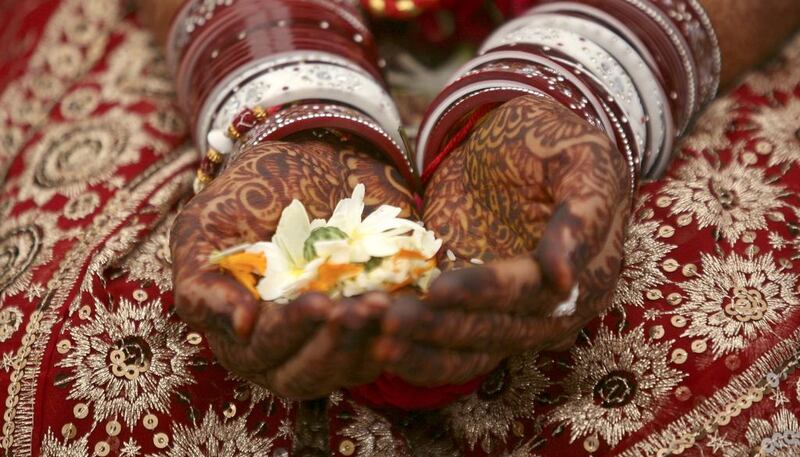How do arranged marriages work out for women who are expected to be career-minded at work and complacent at home? Amrit Dhillon chats about this and more with the author Nandini Krishnan, whose book on the subject has been published by Random House India
In her new book on arranged marriages in India, Hitched: The Modern Woman and Arranged Marriage, Nandini Krishnan examines how the arranged marriage system has evolved over the years. Here's her take.
In the course of your research, what were some of the big surprises?
I was surprised that there doesn't seem to be much difference between a love marriage and an arranged one in the immediate aftermath - all newlyweds face similar challenges. I was speaking to a friend who married her boyfriend of three years, and she told me that however well you think you know a man, living with him will spring its share of surprises.
A huge positive for me was coming across arranged marriages that transcend caste and religion. I've written about a Muslim woman who was vegetarian by choice, and drawn to Hinduism as a child, and eventually had an arranged marriage with a Brahmin.
Are the expectations from a woman too high, in that she is expected to be dutiful and homely, as earlier, but also a career woman bringing home good money?
There are certain families that have ridiculous expectations and want a bride who is Indra Nooyi, Nigella Lawson and Gisele Bündchen rolled into one. But men of this generation are far more understanding and cooperative than their fathers, changing diapers and taking turns with night feeds.
The idea that men don't marry the kind of women they date has become obsolete, too. One of my interviewees said he wanted to marry a gamer, and he doesn't care what else she's good or bad at. Though I found that funny at first, I later realised it's not too different from wanting a spouse who reads. If playing video games is your idea of relaxing, you would want to share that with your partner. Compatibility has become more important than traditional criteria for eligibility.
Have arranged marriages survived because young Indians are conformist and obedient?
I think there's less cause to rebel against arranged marriage because most people of this generation - at least among the modern, urban, educated elite - are not forced into marriages. No one wants a marriage to end badly. It may also be that young people have usually had a few serious relationships these days, which have eroded some of their sharp edges. They're perhaps disillusioned enough to lower their expectations of marriage.
Has the internet improved or worsened the experience of finding a match?
It's been both, for men and women. For one, it has made people far more transparent. You know where someone has worked, you find out if you have mutual friends on Facebook, and you make your enquiries. On the other hand, it also offers anonymity for someone who wants to stay anonymous. In such cases, transparency becomes a delusion. One often reads reports about women who have been lured by sexual predators, con artists and other kinds of criminals online.
You were surprised at how successful arranged marriages can be. Do they have a charm of their own that some people in the west don't realise?
I think they work because people enter an arranged marriage with more trepidation. In some sense, they're prepared for the worst. In a romantic relationship, expectations tend to rise at every stage - the first date, the first kiss, your first vacation as a couple. So, when they get married, their expectations rise as well - or they expect things to be a certain way, and are disappointed when they are not.
A friend who had an arranged marriage spoke about how, in a love match, one can put one's best foot forward, even for several years, because you get a break from your partner as long as you live in separate homes. But when you are with one person 24/7, his or her ugly side starts to peep through. In an arranged marriage, people have less time to show their most flattering angles; they are, perhaps, more prepared for compromise, more willing to not have everything.
Do you get the impression that Indian men are less evolved and less refined than Indian women?
I think that's a tad unfair on Indian men. The men I spoke to have had their share of horror stories as well. One was stalked from one city to another by a girl. He also met a woman who insisted that he acquire an MBA to become more eligible. There's another anecdote about a girl who started firing questions at a prospective partner about his stance on miniskirts and boarding schools. There are sensible, intelligent people of both sexes but somehow they seem to meet a lot of freaks before they meet each other.
* Hitched: The Modern Woman and Arranged Marriage by Nandini Krishnan is published by Random House India
artslife@thenational.ae
The modern take on marrying a stranger
In her new book on arranged marriages in India, Hitched: the Modern Woman and Arranged Marriage, Nandini Krishnan examines how arranged marriage has evolved over the years.

Editor's picks
More from The National




